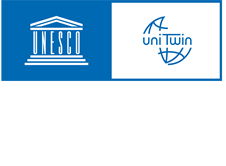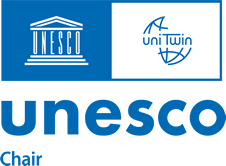
Targets
The UNESCO Chair on “Health Education an Sustainable Development” is conceived as “multidisciplinary chair” aimed at fostering transfer of knowledge on Health and Sustainiblity, which represent challenging topics for the XXI century at global level.
General Objective
The long-term objective of the project is to enhance health status of populations by facilitating a “Knowledge Transfer Exchange” about the effects on human health of major cultural, nutritional and environmental factors.
Specific objectives
- Implementing University and school-based innovative curricola to foster the adoption of healthy nutritional habits and life styles by focusing on cultural determinants of health;
- Fostering epidemiological studies in Italian and European regions suffering from high obesity rates and heavy environmental pressure (local environmental emergencies) in order to assess the role of cultural determinants on the development of the diseases;
- Building up registries and databases for sharing of information between scientists;
- Transfer of knowledge in the frame of “search and reapply strategies”: what we have learnt can be used to foster global health and prevention;
- Strengthening links between Universities and other institutions or development bodies involved in the project.
- Publish scientific articles under UNESCO Chair activities: original research articles addressing the topic of cultural, nutritional and environmental determinants of health, and pilot experiences suitable for transferability;
Major fields of activities
– Training for public officers (including mayors and their staff) and entrepreneurs concerning best practices and legal/ethical issues about environment-friendly intitiatives and sustainable development;
– School-based nutritional interventions aimed at preventing overweight and obesity since childhood by focusing on Mediterranean Diet (UNESCO heritage);
– epidemiological studies and exposomic research in areas experiencing high rates of obesity (both in children and in adults) and heavy environmental pressure, that can become a valuable model for other regions at national and international level;
– “Search and reapply” or development of original preventive interventions to reduce short and long term negative health outcomes;
– European joint doctorate with other UNESCO Chairs under the UNESCO Chair activities through the possibilities offered by the EU Marie Curie Program;
– Post-graduate master program in Italian and English on “Cultural, Nutritional and Environmental Determinants of Health”; timing=Year 1-4; expected outcomes: training of multidisciplinary specialists;
– Winter School on “Methodology for Systematic Reviews and Metanalyses” and a Summer School in “Epidemiology and Statistics for clinical trials” focusing on culture, environment and health; timing=Year 1-4; expected outcomes: training of multidisciplinary specialists;
– Activate a specific curriculum in “Cultural and Environmental Determinants of health” at Federico II Medical School (compulsory for students who want to take their degree in Medicine), to be proposed for adoption in other Medical Schools at Italian and European level (including eastern Europe and Mediterranean countries);
– On-field initiatives for the prevention of avoidable diseases presenting metabolic and environmental susceptibility (i.e. thyroid dysfunctions, diabetes and metabolic diseases, respiratory conditions, neoplasms) to be organized trough the implementation of an “health campus” (with on-field specialists and medical diagnostic devices) in the central squares of Naples and other cities, thus representing a valuable model to be replicated in other Italian and European regions;
– Initiatives for the prevention of childhood obesity, promotion of healthy diet (focusing on the benefit of Mediterranean diet) and physical activities will be carried out using unconventional strategies (i.e. story-books for children, presentations in schools; sport sessions);
– Seminars, publications, and conferences;
The UNESCO Chair of Health Education and Sustainable Development addresses the First UNESCO priority concerning “Information for development (being aimed at providing access to information and knowledge for a sustainable development) as well as Second and Third UNESCO priorities concerning “Information Preservation” and “ Information Accessibility”
The Chair covers the UNESCO Strategic Program Objectives N. 2 (Developing policies, capacities and tools for quality education for all and lifelong learning as well as promoting education for sustainable development) – N. 3(Leveraging scientific knowledge for the benefit of the environment and the management of natural resources) – N.4 (Fostering policies and capacity-building in science, technology and innovation) – N. 5 (Contributing to disaster preparedness and mitigation) – No. 7 (Enhancing research-policy linkages on social transformations) – N.8 (Fostering research on critical emerging ethical and social issue) – N. 9 (Strengthening the contribution of culture to sustainable development) – N. 12 (Enhancing universal access to information and Knowledge) and focuses on Overarching Objectives 2 (Mobilizing science knowledge and policy for sustainable development) and3 (Addressing emerging social and ethical challenges).
Domains/disciplines of the Chair are concerning cultural, nutritional and environmental determinants of health and address the Millennium development goals concerning the “ensuring of sustainable development” (Target 7.A: Integrate the principles of sustainable development into country policies and programs and reverse the loss of environmental resources” both in developed and in developing countries and at the same time promote a culture of healthy behaviors). In addition, cultural and nutritional gaps, as well as environmental pollution may result in higher “children mortality” and reduced “maternal health”, as well as in spreading of non-communicable “diseases”, which represent three additional millennium development goals set by United Nations.

